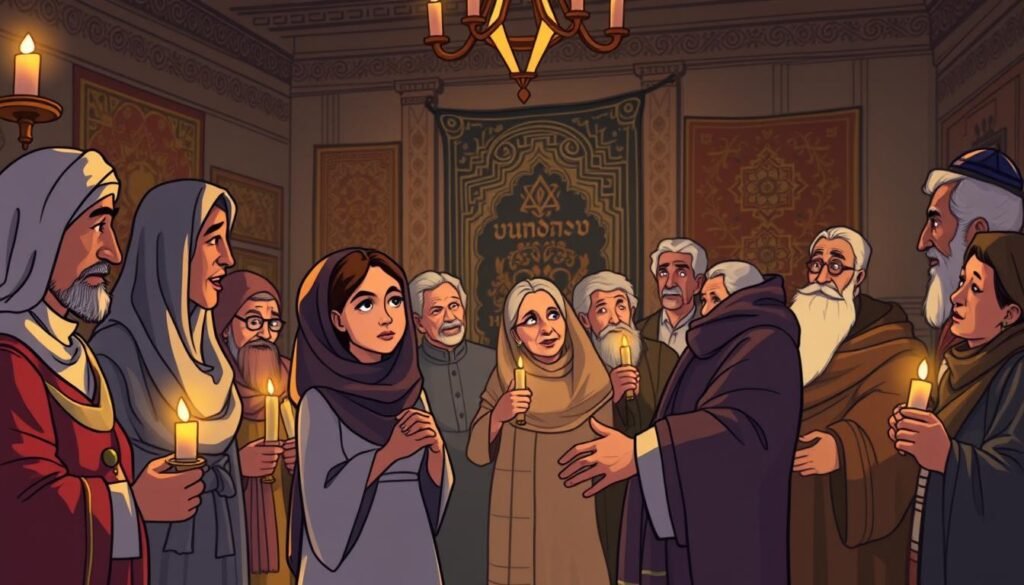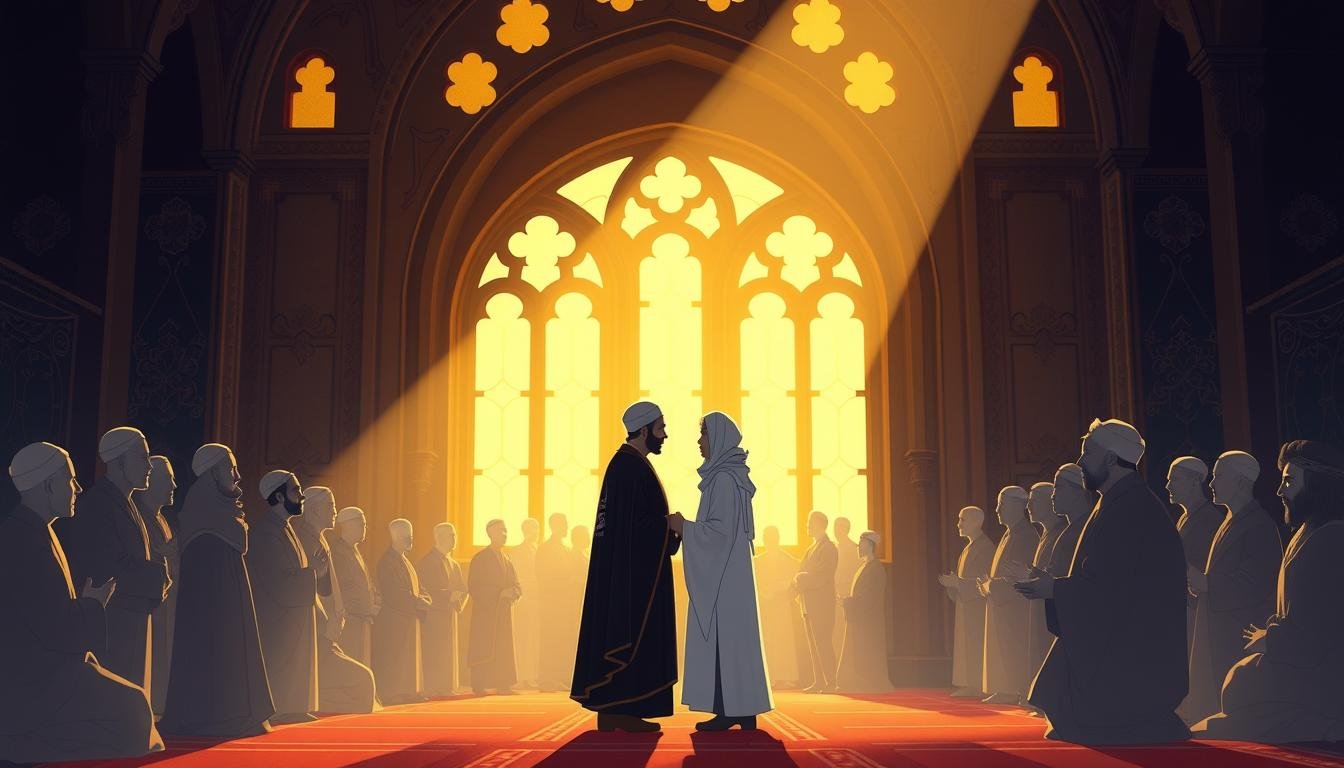Last year, I saw a couple in a park. The man wore a kippah, and the woman had a hijab. Their happiness made me think about love crossing boundaries. Many wonder if a Muslim can marry a Jewish person, balancing faith and life.
In the U.S., almost one in ten Muslim women marry outside their faith. This shows tradition and change meeting. Islamic scholars have debated what’s allowed for centuries. Exploring these topics, I’ve seen how love between faiths can deepen our understanding of Islam.
Historical figures like ʿOthmān Ibn ʿAffān married a Christian, but today’s rules vary. In Tunisia, Muslim women can choose freely, but in Malaysia, they must convert. These examples highlight how culture and law impact lives. This article seeks to understand how ancient texts and modern hearts can meet.
For those thinking about marriage or supporting loved ones, this article will help. We’ll look at legal frameworks, cultural realities, and personal stories. Exploring Muslim interfaith marriage needs both knowledge and empathy. We’ll dive into scholarly views and the everyday challenges of families.
Understanding Interfaith Marriages in Islam
Interfaith marriages bring up complex issues in Islam. At its heart, Islam sees marriage as a bond that brings together spiritual and social aspects. Let’s look at how these ideas shape interfaith relationships.
Basic Principles of Marriage in Islamic Jurisprudence
Allah’s teachings focus on making marriages harmonious and religiously compatible. Islamic rules for marriage stress the importance of respecting each other’s faith. This includes following dietary laws and praying together.
The Quran teaches the value of taqwa (piety). It guides couples to make choices that uphold moral values. For instance, Surah Al-Baqarah 2:221 advises against marrying those who mock religion.
Categories of Interfaith Marriages
Islamic law categorizes non-Muslims into two groups: Ahl al-Kitab (People of the Book) and others. Ahl al-Kitab includes Jews and Christians, who are seen as having received divine revelation. This classification affects who can marry whom.
Muslim men can marry Ahl al-Kitab women under certain conditions. But Muslim women cannot marry non-Muslims. These rules aim to protect Islamic values in families.
The Concept of Ahl al-Kitab (People of the Book)
The term Ahl al-Kitab highlights the shared monotheistic beliefs between Islam and earlier revelations. Quran 5:5 allows Muslim men to marry Ahl al-Kitab women. But they must follow chastity and religious dignity.
Yet, scholars argue about applying this rule today. For example, Ibn Kathir’s commentary warns against marrying those whose beliefs go against Islamic ethics.
Quranic Verses Regarding Marriage to People of the Book
Discussions on Interfaith marriage in Islam often focus on Quranic verses. These verses outline who can marry whom. The Quran says Muslim men can marry chaste Jewish or Christian women in Surah Al-Ma’idah 5:5, which states:
“This day are lawful to you the good things of life, and the food of those who were given the Scripture is lawful for you.”
Verse 2:221 talks about who can and cannot marry. It says not to marry idolaters. Instead, it suggests marrying those who believe in one God. But, the Quran doesn’t say Muslim women can marry Jewish or Christian men. Scholars think this is to keep Muslim faith strong.
Today, people debate what it means to be “chaste” and true to one’s faith. Scholars say “People of the Book” must really believe in their faith. They can’t be secular Jews or Christians. This helps guide Muslim Jewish relationships by allowing faith but keeping it pure.
Can a Muslim Marry a Jewish Person? Core Islamic Rulings
Islamic law says can a muslim marry a jewish differently for men and women. Men can marry Jewish women, known as Ahl al-Kitāb, under certain rules. The Qur’an (5:5) allows this, asking for the woman to be pure and faithful.
But, women can’t marry Jewish men, scholars agree. This rule comes from worries about faith and family.
Traditional rules say Muslim men must make sure their Jewish wives stay true to their faith. The marriage must be agreed upon and include a dowry. But, Muslim women face more rules, as scholars use verse 2:221 to block marriages to non-Muslims.
Today, there’s debate about these rules. Some say the Qur’an doesn’t clearly ban women from marrying Ahl al-Kitāb men.
“The text’s ambiguity leaves space for reinterpreting prohibitions in light of modern realities,” argue reformist scholars.
Modern families in Muslim interfaith marriage face challenges. Men can marry Jewish women, but women’s choices are limited. Scholars like ʿAllāmah Ṣanʿānī think we should rethink old rules.
Most Muslims stick to traditional views, but some want to change. This shows a struggle between following the text and adapting to today’s world.
Historical Context of Muslim-Jewish Marriages
To understand Muslim-Jewish marriages in Islam, we must look at history. Early Islamic societies tried to balance faith with living together. The 7th-century Ashtiname treaty is a good example. It showed Islam’s early acceptance of People of the Book.
Though we don’t have many records of these marriages, we can see the complexity of the time.

Examples from Early Islamic History
In Medina, Muslims and Jews worked together. The Prophet Muhammad didn’t marry a Jew, but some of his followers did. For example, Ka’b ibn Ashraf, a Jewish scholar, was connected to Muslims.
This shows how personal relationships could go beyond religious differences. The first Islamic waqf, given by Mukhayriq, a Jewish convert, also shows cooperation.
Marriage Practices in Medieval Islamic Societies
In Al-Andalus, Samuel ibn Naghrillah, a Jewish leader, worked well with Muslim rulers. His role shows how social status could ease religious rules. Legal texts from then show Jewish wives could keep their faith, as long as their kids were Muslim.
This balance between Quranic rules and real life is interesting. It shows how men could marry Jewish women, but not the other way around.
Social Dynamics in Historical Communities
In medieval times, Jews had protected status under dhimmi laws. But, when faith and love clashed, problems happened. The 12th-century Almohad purges in North Africa were a big contrast.
The Khazar Kingdom, where a Turkic state became Jewish, and the Volga Bulgars, who became Muslim, show how different places were. These stories highlight how power and local ways of life affected how people got along.
Even when scholars debated Q. 2:221, people found ways to live together. This shows that tradition and new ideas can both be part of our lives.
Different Interpretations Among Islamic Schools of Thought
Islamic marriage rules vary a lot across different schools of thought. This shapes how Muslim-Jewish relationships are seen. Sunni scholars in the Hanafi school let Muslim men marry Jewish women with fewer rules. They focus on finding a good match.
Maliki scholars, on the other hand, look at if the non-Muslim spouse will raise kids as Muslims. Shafi’i and Hanbali views mix these ideas. They balance strict rules with what works in real life. Shi’a views often stick to old rules, showing a focus on keeping religious identity strong.
Modern scholars like Khaleel Mohammed and Daayiee Abdullah say gender-based marriage rules come from old times, not God. They suggest looking at verses like Quran 5:5 with today’s values. But traditionalists worry that easing these rules could harm community unity.
“Scholars must consider how Muslim Jewish relationships today reflect shared values, not just ancient precedents,” notes reformist thinker Hassan al-Turabi.
These debates show how Islam can change. While old texts are important, each school has its own way of seeing things. Families today must think about what scholars say and what they believe personally.
Practical Considerations for Modern Couples

Modern interfaith couples in Islam face many challenges. They deal with faith, culture, and law all at once. Scholars say it’s all about understanding each other’s backgrounds and laws. It’s a mix of old traditions and new ways.
Religious Identity of Children
Choosing how to raise kids is key. Islamic teachings say kids should be raised Muslim. But, couples often look for a middle path.
Some teach both faiths, while others focus on shared values. The Quran calls Jews and Christians “People of the Book” (5:5). This helps couples find common ground. Many families make plans for religious practices before they get married.
Cultural and Family Challenges
Family opposition is a big issue. Muslim parents worry about their child’s faith. Jewish families might doubt cultural fit.
“Openness to learning about each other’s traditions builds trust,”
a rabbi-Imam panel said. But, disagreements can arise during holidays or family events. Overcoming these needs patience and respect.
Legal Requirements in Different Countries
Legal hurdles add to the challenge. In the U.S., civil marriage is okay, but religious approval depends on local leaders. In many Muslim countries, Muslim women can’t marry outside their faith. This raises the question, “can a muslim marry a jewish partner?” under certain rules. Couples must check local laws and community norms.
Navigating Religious Practices in a Muslim-Jewish Household
Creating a peaceful Muslim Jewish home means finding common ground. Talking openly is key, as 70% of couples in interfaith marriages say it boosts happiness. Yet, 30% of Muslim parents might not approve, but respect can turn differences into connections. As The Guardian points out, these marriages show a shift towards understanding between faiths.
Dietary Laws and Restrictions
Halal and kosher rules offer a starting point. Both ban pork and emphasize cleanliness. But, they differ, like with shellfish, so couples must find a middle ground. Many share kitchen duties, blending respect for culture with practical needs. Pew Research says 40% of Jewish Americans marry outside their faith, making such compromises common.
Holiday Observances and Religious Ceremonies
Handling holidays like Ramadan and Yom Kippur requires creativity. Over 25% of couples face challenges, but 70% grow closer through shared rituals. For example, lighting Hanukkah candles or fasting together can bring them closer. Marriages succeed when partners focus on understanding each other’s traditions.
Prayer and Worship Considerations
Prayer styles differ, but shared values like gratitude and community unite. Jewish partners might go to Friday prayers, while Muslim spouses join Shabbat services. Over 60% of couples manage to worship personally without feeling pressured to change. This way, faith becomes a shared journey, not a divide.
FAQ
Can a Muslim man marry a Jewish woman?
Are Muslim women allowed to marry Jewish men?
What are the primary conditions for a valid Muslim-Jewish marriage?
How should children be raised in Muslim-Jewish households?
What historical examples exist of Muslim-Jewish marriages?
Are there different interpretations among Islamic schools of thought regarding interfaith marriage?
What practical challenges do modern Muslim-Jewish couples face?
How can Muslim-Jewish couples address dietary laws in their households?
What should couples consider when observing religious holidays together?
How can prayer and worship be integrated in a Muslim-Jewish home?

Embracing Faith, One Insight at a Time!
The teachings of the Quran have always guided my path. With a deep passion for Islamic knowledge, I strive to blend the wisdom of tradition with the relevance of today, making the timeless messages of Islam accessible and meaningful for everyone.
Muslim Culture Hub is my platform to share historical insights and thought-provoking articles, exploring both well-known and lesser-discussed aspects of Islamic culture and beliefs. My mission is to create an inclusive online space where everyone can learn, strengthen their faith, and connect with the profound message of Islam.
Join the journey!
May peace be upon you.








